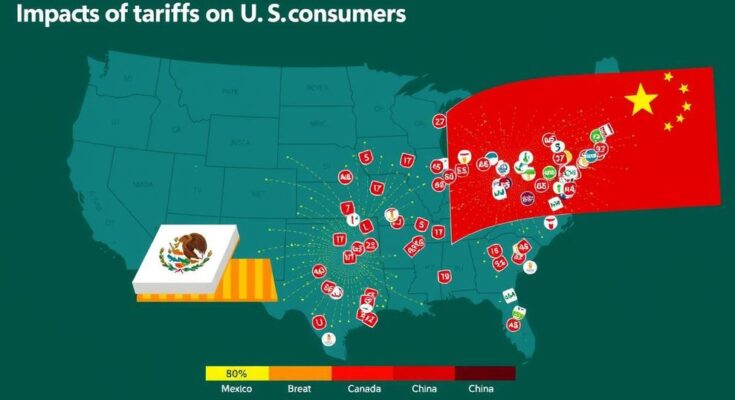Former President Trump’s proposed tariffs on imports from Canada, Mexico, and China could substantially raise consumer prices on essential goods, including oil, vehicles, and food products. Experts warn of increased inflation that would particularly impact household budgets, as the U.S. heavily relies on these nations for a significant volume of imports, totaling billions annually. The economic ramifications pose a considerable challenge to the American public amidst already rising prices.
The proposed tariffs by former President Trump on bilateral trade with Mexico, Canada, and China, have provoked significant concern regarding their potential impact on U.S. consumers. With a 25 percent tariff on imports from Canada and Mexico and an additional 10 percent on goods from China, Americans could face substantial price increases on a wide range of products. Items such as crude oil, vehicles, electronics, sugar, meat, vegetables, and various consumer goods sourced from these countries would see price hikes, thereby intensifying inflation and straining household budgets. Given that Canada, Mexico, and China represent the largest trade partners for the United States, the repercussions could be widespread and detrimental to consumer spending power. Economic experts have projected that such tariffs may specifically drive gasoline prices higher, impact the automotive industry drastically, and increase costs for essential goods, from food items to toys.
The context of this discussion centers on the tariffs introduced by former President Trump aimed primarily at reducing imports from crucial trade partners – Canada, Mexico, and China. The rationale behind these tariffs purportedly includes curtailing crime, drugs, and illegal immigration. However, the economic implications reveal a complex reality wherein the tariffs are likely to inflate prices for consumers rather than affect the targeted foreign economies. Major imports from these countries vital to everyday American life encompass oil, automobiles, electronics, and agricultural products, all of which hold significant stakes in U.S. consumer costs. The dynamic of international trade has made the U.S. economy interdependent on imported goods, emphasizing the challenges of tariff implementation.
In conclusion, the imposition of tariffs on imports from Mexico, Canada, and China by former President Trump is set to alter the economic landscape for U.S. consumers. As these tariffs threaten to increase prices across a spectrum of goods—from fuel to food—the risks of heightened inflation and economic strain are pronounced. While the intention may be to bolster domestic production, the reality may lead to increased costs that could adversely affect households across the nation, highlighting the complexities inherent in trade policy.
Original Source: www.independent.co.uk




